- News
- Reviews
- Bikes
- Accessories
- Accessories - misc
- Computer mounts
- Bags
- Bar ends
- Bike bags & cases
- Bottle cages
- Bottles
- Cameras
- Car racks
- Child seats
- Computers
- Glasses
- GPS units
- Helmets
- Lights - front
- Lights - rear
- Lights - sets
- Locks
- Mirrors
- Mudguards
- Racks
- Pumps & CO2 inflators
- Puncture kits
- Reflectives
- Smart watches
- Stands and racks
- Trailers
- Clothing
- Components
- Bar tape & grips
- Bottom brackets
- Brake & gear cables
- Brake & STI levers
- Brake pads & spares
- Brakes
- Cassettes & freewheels
- Chains
- Chainsets & chainrings
- Derailleurs - front
- Derailleurs - rear
- Forks
- Gear levers & shifters
- Groupsets
- Handlebars & extensions
- Headsets
- Hubs
- Inner tubes
- Pedals
- Quick releases & skewers
- Saddles
- Seatposts
- Stems
- Wheels
- Tyres
- Health, fitness and nutrition
- Tools and workshop
- Miscellaneous
- Buyers Guides
- Features
- Forum
- Recommends
- Podcast
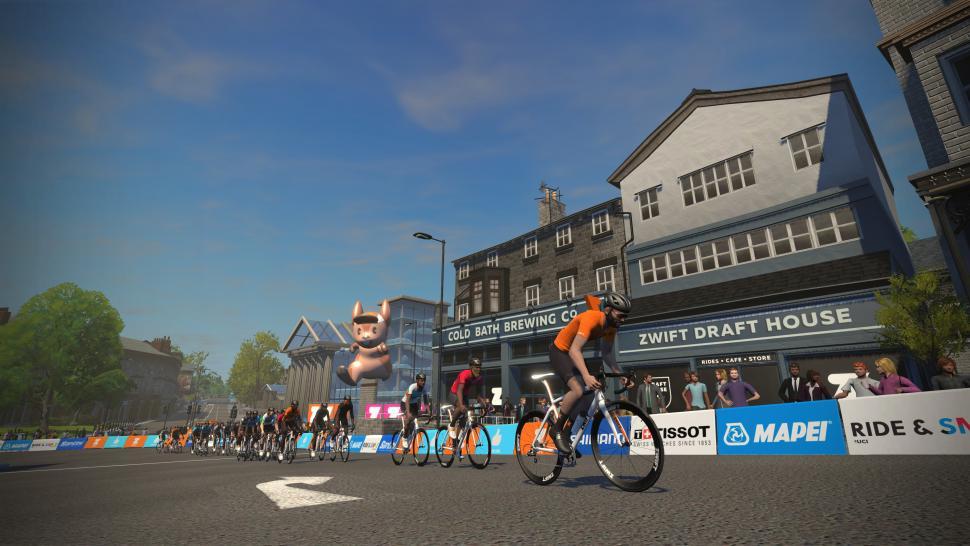 zwift-yorkshire1_1
zwift-yorkshire1_1Are you a Zwift addict? The gamification of indoor cycling platforms
People often joke about getting hooked to Zwift, doing endless races to hunt down the 'Tron' bike—but we've heard reports that riders are concerned about crossing the line between dedication and addiction. While we can all agree that the emergence of virtual cycling platforms like Zwift and RGT Cycling has made dreaded indoor turbo workouts a lot more bearable, are there any unexpected negative consequences?
With these platforms being so engaging and motivating—thanks to in-game achievements and the social dynamics—significant fitness gains can be made. They can make it much easier to commit to exercising on a regular basis, with many of us being able to leave the bike hooked up to a smart turbo trainer and screen. It’s all ready to go, at any hour we desire—there’s an incredible choice of group rides, events and races to sign up to as well. With virtual platforms being a worldwide community, you can log in at any time of day (or night) and not feel alone when roaming the roads.
> Find out how it’s possible to set yourself up on Zwift with a tight budget.
Making it easier to hop on the bike, being encouraged to exercise and complete your workout is surely a good thing, right? But where is the line between motivation and compulsion, and when does commitment become addiction? How easy is it to fall into doing too much, and slip into overtraining?
The 'gamification' of sports apps
Integrated game elements in platforms like Zwift are included to encourage riders to perceive exercise as a fun activity, and motivate users to behave in certain ways. These gamified features that are motivating you to cycle are also the tactics used by companies to increase user retention. It’s a two-way relationship—the virtual platforms are helping you to train and get fit, but these companies require your subscription to run their business.
> Buyer's guide: Best indoor cycling apps
Right from the off, the cartoon-style graphics on Zwift, as well as having your own in-game avatar that you can dress up, gives the impression that the platform is a game. It’s an awful lot more physically exhausting than the experiences of typical gamers firing their fingers at their keyboard or controller—but in many ways, it’s not so dissimilar as there are a fair few gamified features on Zwift. These game elements can be split up into achievement-, social- and immersion-oriented.
> Buyer's guide: Best smart turbo trainers
Cool looking kit, faster aero and lightweight bikes, and more challenging routes can only be unlocked as you accumulate 'XP' (experience) points and level up. You can collect more XP by riding further and completing workout blocks. The progress bars for levelling up are also placed with notable prominence next to useful data metrics, like total time riding and kilometres ridden.
There’s a lottery style element—the highly prized Lightweight Meilenstein wheelset for you virtual bike can only be obtained at the top of the Alpe du Zwift, if you get lucky on the prize wheel after climbing 1,035 metres.
Even when you haven’t entered a race, riding around there are leaderboards for segments including climbs, sprints and laps. On each of these 30 day PR’s and live results for the overall leaderboard are displayed. Lots of different achievement badges can also be obtained: from dropping 1000 watts, to completing the Alpe du Zwift in under an hour.
A recent study published this year in the European Journal of Management and Business Economics explored users interaction with achievement-related elements in sports apps. The research found these gamified features were successful in motivating users because they satisfied the psychological need for competence, autonomy and relatedness.
But, how do these gamified features in Zwift relate to exercise addiction?
Exercise addiction
Dr Mark Griffiths, Professor of Behavioural Psychology at Nottingham Trent University, explains that all addictive activities have predispositions that play a contributory role in somebody becoming addicted to something. These can be split in structural and situational characteristics.
With exercise addiction, the easy access at-home indoor set up is a situational characteristic, while the built-in gamified features of Zwift are structural characteristics.
Dr Griffiths says: “Reinforcement is key to any type of addiction. The more reinforcers and rewards that exist, the more likely you are going to become a habitual user of that particular activity”.
The many rewards are supplied by Zwift, and the number of these rewards available to you is extensive as the platform can be used inside your home. You can ride on your turbo and play Zwift at any hour of the day... it’s never closed.
Dr Griffiths explains that he’s never met anybody addicted to a bi-weekly national lottery because you can only find out the result of your gamble once on a Wednesday night and once on a Saturday night, whereas with a slot machine you can gamble 12 times a minute: “The rewards come thick and fast”, he adds.
In cycling terms, it could be said that road cycling is a bit like the bi-weekly lottery, while turbo trainers and virtual cycling platforms combined together are the 'slot machines' that allow you to play all the time.
Before these virtual platforms came along, the amount of cycling we were motivated to do on the road was impeded by:
- Daylight hours (particularly during winter and around work schedules)
- Pleasant weather conditions (avoiding heavy rain and high gusts)
- Season appropriate wardrobe (winter kit costs a fair amount)
- Spare time (it’s harder to commit to a ride that could be strung out by punctures and other mechanical issues)
- Cleaning the bike (just ugh, especially after darting along narrow, gritty lanes!)
- Suitable local routes (living in a city it takes longer to get to ‘nice’ and low traffic roads)
Also, it's arguably much easier to engage with the competitive side of Zwift. For many of us, there’s not a nearby cycling circuit for weekly evening races. Even if you are lucky enough to have a local crit and get there in time after work, the entry fee of up to twenty quid a smashfest is definitely not cheap... and there’s the British Cycling racing licence for the season to factor in as well. Zwift costs just £12.99 a month, and you have access to unlimited races.
> Buyer's guide: Best indoor cycle training kit
Even though it could be argued that there are more of these reinforcers and rewards with virtual platforms, Dr Griffiths stresses that the habitual activity itself is not an addiction: “It might something that lowers your productivity and takes up a lot of your time, but it is not an addiction in the way I categorise it.”
How to tell if you are genuinely addicted to exercise
In understanding what classifies as exercise addiction, Dr Griffiths says: “I use the word addiction in exactly the same sense as I would if I was talking about an alcohol or drug addiction, or another behavioural addiction like gambling”.
To be actually addicted to something (excercise in this case), Mark says you have to endorse all of his six criteria:
Salience
“You will do the activity at the neglect of everything in your life. Even when you are not actually doing it, you are thinking about the next time you are going to do it—you are totally preoccupied with it.”
Mood modification
“You are kind of self-medicating by using the activity to get buzzed up high, aroused or excited, or to do the exact opposite, to tranquillise, to numb or to escape. You use it at different times for different mood modifying effects.”
Tolerance
“You need more of the activity over time to get those same initial mood modifying effects.”
Withdrawal symptoms
“You are going to feel increased irritability, moodiness, frustration, on a psychological level, if you are unable to do the activity. But also on a physiological level, you’ll get nausea and stomach cramps.”
Conflict
“You are doing this activity at the neglect of everything else. The activity is so conflicting in your life that it is compromising your personal relationships, your education or work depending on what age you are, and your other hobbies.
“There’s also what we call intrapsychic conflict—conflict within yourself. You know that you are doing this activity too much, that you should probably cut down and stop but you feel unable to do so and you experience a subjective loss of control.”
Relapse
“If you have managed to give up your activity of choice—say you managed to give it up for two days, two months or even two years—when you start engaging in the activity again you go straight back into the kind of addictive cycles you were in before.”
According to Dr Griffiths, fulfilling all of his criteria is difficult to do, and therefore he believes those who can be diagnosed as exercise addicted are few and far between. Even with all of the gamified elements that are present in platforms like Zwift, these features only provide an increased opportunity to become addicted to the activity - so even if you're a very regular user of a virtual training platform, you most likely aren’t addicted.
Overtraining
Aside from the social and environmental benefits, we ride our bikes to stay healthy, get fitter and stronger, and some of us will target events like sportives or races which we have to prepare for; but it is possible to overdo it when attacking workouts and not devote enough time to recovery. In extreme circumstances, this could result in overtraining syndrome, or 'burnout'.
With the accessibility and intensity that training indoors on virtual platforms brings, it can be easier to get carried away and see your performance fall of a cliff. When overtraining syndrome is reached, it takes much longer to return to your previous fitness and health levels.
With the constant presence of other riders on the virtual roads and plenty of overtaking going on, this could spur you to push on. This is great when it is one of your hard sessions of the week, but not day in, day out—especially when you're trying to execute a steady zone one ride (under 55% of your threshold, or Functional Threshold Power).
> All you need to know about FTP
Former British National 10, 25, 50 and 100 Mile TT champion, Matthew Bottrill of Performance Coaching, adits: “You can easily get sucked in to online platforms and end up training and racing in zones that are too hard too much of the time."
Bottrill says one of the most commons issues is failing to build up steadily, and this is more easily done by signing up to lots of events on the virtual platforms.
“It’s the variation in training that will give you the biggest rewards and when competing on Zwift too frequently you end up neglecting the basics, that essential middle ground", Bottrill stresses.
“All of your time in Zwift racing ends up being spent in zone five (106-120% of FTP), but it’s really important to train at 70-90% of your threshold to lay some good fitness foundations.”
To ensure you mix it up, Bottrill says: “I’d recommend pre-planning your week so you don’t end up just entering another Zwift race or 'smash session'—it’s too easy sometimes to just do hard workouts”.
How to tell if you have overtraining syndrome
Bottrill has had overtraining syndrome himself in the past. He says: “It absolutely wipes you out, I remember I was like a zombie. Just so exhausted, it felt as though I had the flu and I wasn’t capable of doing anything.”
Although different for everyone, Bottrill says that early tell-tale signs extend both the mental and physical, and can include: a lack of appetite, increased snappiness and irritability, not sleeping properly at night, increased daytime sleepiness, not being to get your heart rate up or hitting your power numbers, along with dips in your performance on consistent days.
In addition to listening to your body, Bottrill recommends downloading your data, uploading this to third party platforms like Training Peaks, and also monitoring metrics such as heart rate variability: “By looking at your previous history you’ll be able to see trends in your training and notice if there are any dips", Bottrill says.
“If you see a big ramp up in what we call Chronic Training Load (CTL) and then it falls off a cliff, at this point you are going to be tired and your form will actually stagnate. But by ramping training up in the correct way, around a two point increase in your CTL a week, the actual risk of overtraining is very low."
Response from Zwift
Zwift's PR manager Chris Snook told road.cc: “The gamification of the platform does provide incentives for people to ride and unlock new kit, level up etc. It’s all designed to be stimulus, but not at the expense of encouraging people to overtrain.
“Within our T’s & C’s and sign up process, there are various warnings around overuse and encouraging people to ensure that they respect their current fitness levels—and if they have underlying health problems, to make sure they consult somebody to make sure they are training safely.
“In the game itself, we try to discourage and prevent overtraining by the flexible training plans we offer. Zwift has a number of different pre-set plans—much like you’d get from a personal coach each week—catering for different abilities and different targets, whether that be for road or off-road. But the game will grey out certain workouts to prevent you doing it all at the start of the week. It makes sure the sessions are spread out in a way that you can recover from each. Overtraining is damaging full stop, but it also prevents you getting the most out of those training sessions if you are entering them fatigued.
“There is also in-game messaging across our workouts and game programming, telling users to take days off and make sure you come into this workout fresh. We are doing our best to encourage safe and responsible training.”
So, can you really get addicted?
As Dr Griffiths outlines, it's very unlikely for even the most committed indoor cyclist to fulfill all of his criteria that would classify someone an 'addict'. Zwift themselves are well aware of the dangers of overtraining, and have taken steps to ensure people train responsibly. That said, there are other issues you might experience from being too involved with the platform, such as overtraining—so it's worth keeping an eye on your metrics and overall health and fitness to prevent this from happening by spotting the early signs.
Anna has been hooked on bikes ever since her youthful beginnings at Hillingdon Cycle Circuit. As an avid road and track racer, she reached the heady heights of a ProCyclingStats profile before leaving for university. Having now completed an MA in Multimedia Journalism, she’s hoping to add some (more successful) results. Although her greatest wish is for the broader acceptance of wearing funky cycling socks over the top of leg warmers.
Latest Comments
- ktache 1 sec ago
But pretty much the only way the killer vehicles can be kept off the protected cycle route is to make the owners believe that the bollards may...
- slc 1 hour 9 min ago
Credit to the author for attending the opposition meetings and trying to understand their concerns, but I agree with hp. There has been significant...
- RoubaixCube 2 hours 9 min ago
I like how youre using a Mojito X to advertise an Mojito 3
- Basemetal 2 hours 30 min ago
The PU dip on the palm and fingers is over the knitted nylon so not chilly in use, and the material is thick enough to provide some cushioning. It...
- Geoff H 2 hours 45 min ago
“jumped-up, arrogant” cyclists motorists causing “carnage” and posing a risk to pedestrians everyone else. Fixed it ..........
- chrisonabike 2 hours 55 min ago
Given that - at least in UK- we have a mostly flip-flop political system and parties in power eventually run out of credit with the electorate -...
- OldRidgeback 3 hours 58 min ago
If he'd been able to get hold of one of the rarer five speeds, it would've had a better choice of ratios. You can see it's got proper brakes, a big...
- David9694 4 hours 8 min ago
But whAT aboUT thE disable d? (Foreground left - pretty faded)
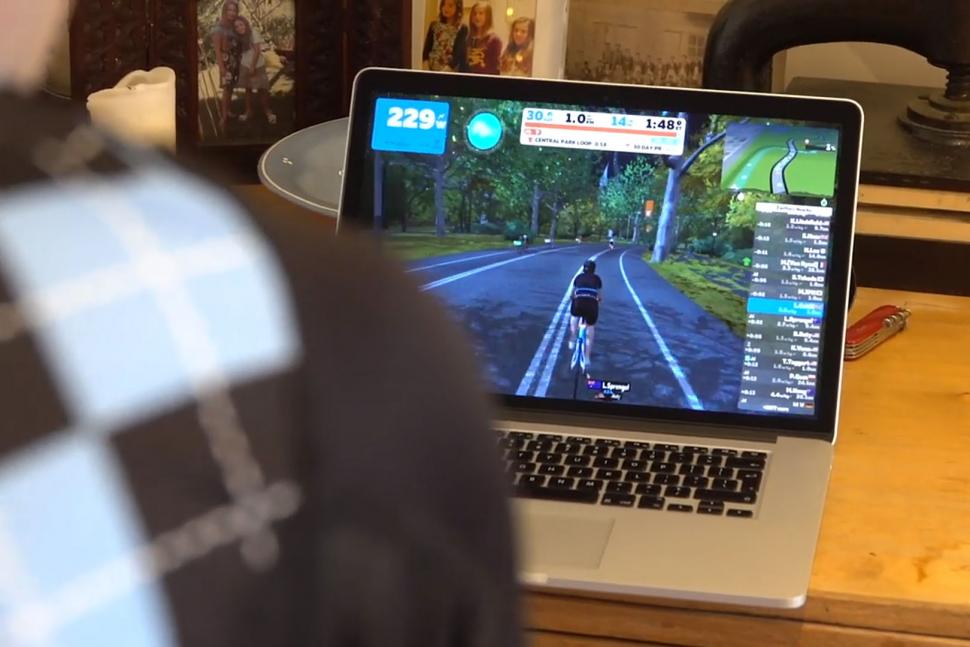
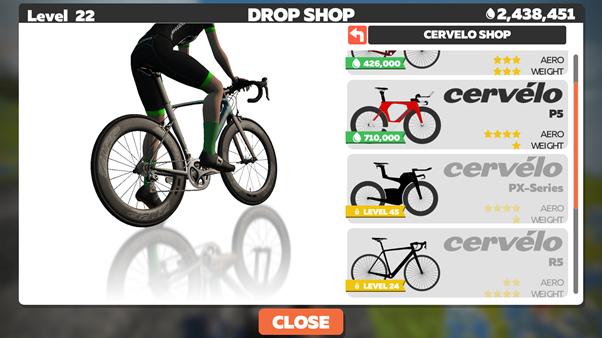
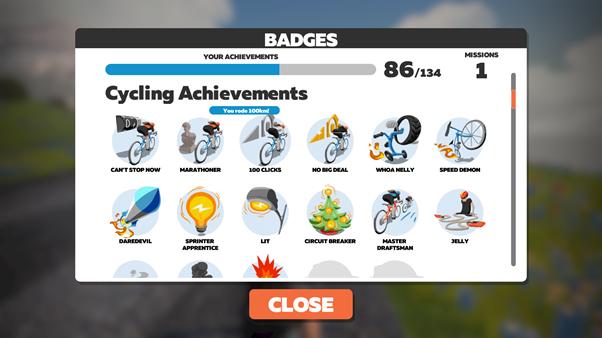
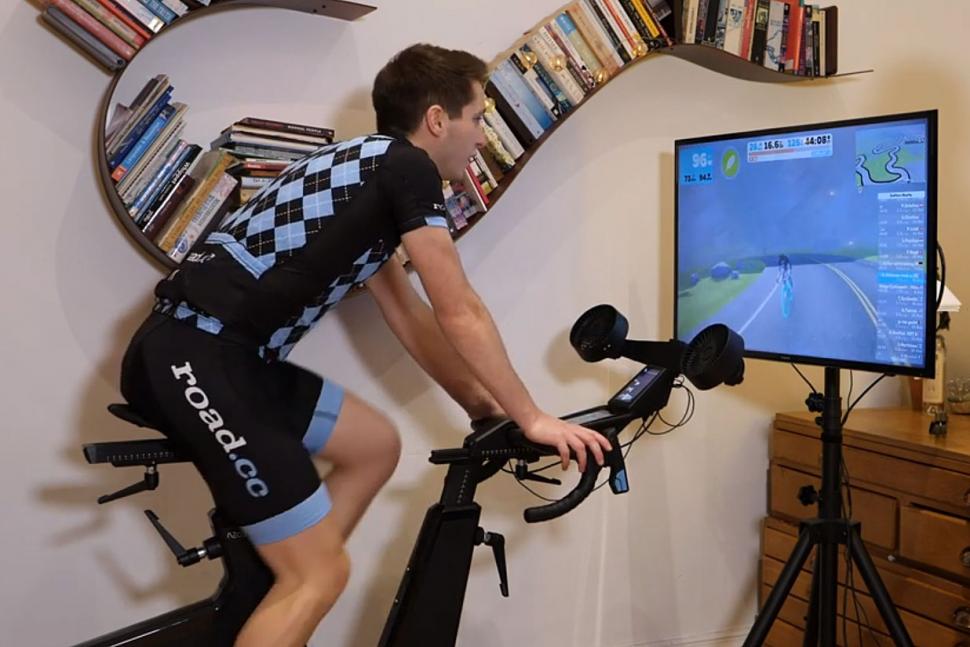
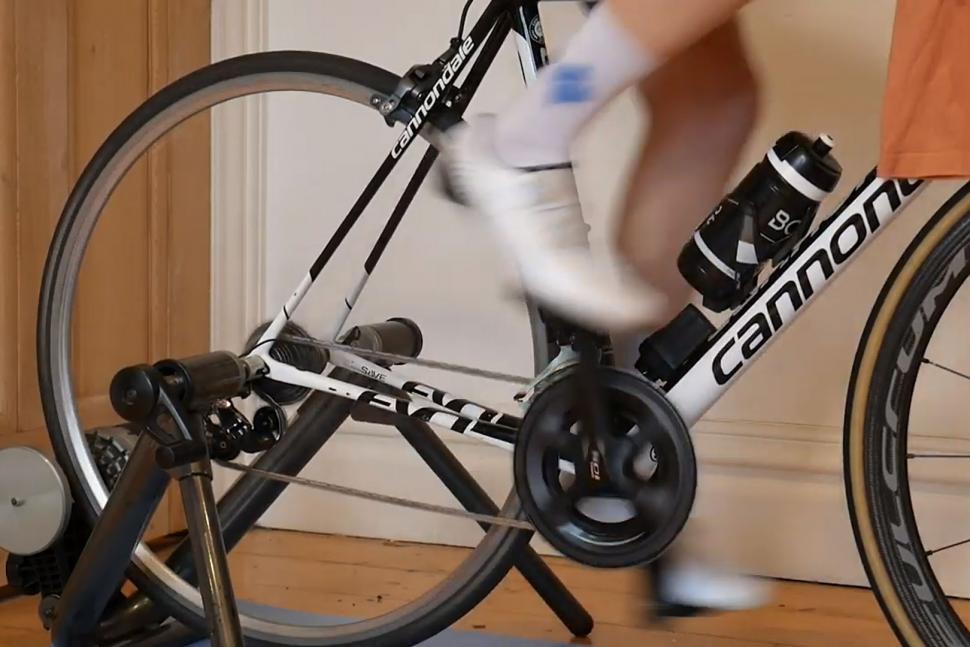
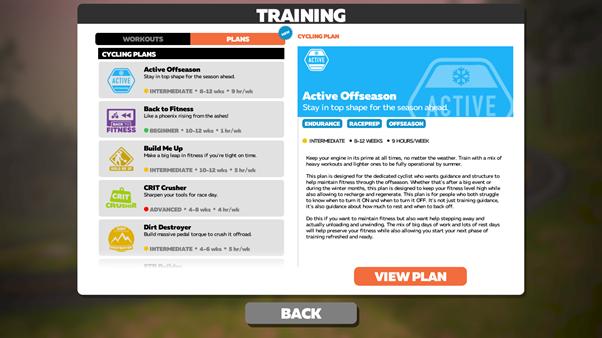
Add new comment
7 comments
Interesting thoughts and definitely worth discussing this topic. I myself didnt actually like Zwift that much exactly because so much of the gamification that was disturbing me. Even though I didn't move far, I am using Rouvy but rather for its possibility to select different routes from around the world and sight-see while riding. I can say it is much less addictive, especially when you like to select favourite climbs
I must be a saddo gamer and an addict then with being at Level 49 and on Zwift since the middle of 2016.
As the IRL road race season for Vets etc was cancelled this year and at the age off 66, I took the decision that enough was enough with the "training" jusy get to enjoy just cycling.
I dont think I'll go back to racing outdoors with my British Masters or TLi Cycling - if they are actually allowed even to hold events in 2021. It's a shame as that road race fitness was hard earnt.
I like pootling to the shops and round about on a nice day on the hack bike.
My old race bike is now firmly attached to the Direto trainer and I am happy to pay the monthly sub to get my "racing" fix even though it is just a bloomin game.
You see I still probably need the fix of competition .
Online is just different and yes please dont donfuse it with proper cycling, I agree.
I also like the complaining afterwards of sandbaggers and weightdopes - just like being back in the race HQ and someone switched on you at the sprint.
Oh, I built up a brand new race bike for 2020, it had one outing at a Darley Moor crit -- now it is a wall decoration. I really should sell it...................................or maybe not......................
Zwifts great, as an addition to proper rides. Don't understand the extreme negativity towards it occasionally see - its not perfect, its not that cheap but its a good motivating tool and all that. I'm still not fit enough, but fitter than I would be without using it. Will be on it tonight since the roads are frozen and its foggy outside so its more dangerous conditions than I want to ride in
I don't get on with Zwift but am quite happy to use Sufferfest or TrainerRoad though even the videos on SF can be a little tiresome after while. I'm not quite sure what it is but it doesn't work for me. It seems to work very well for many others and I'm told it's the social side of it. I would think it's just me being a bit of a grumpy old man but I'm familiar enough with British cycling to know that I am not the only one.
As a non-Zwifter the worst aspect of it is that so many people talk/write/blog/tweet about it all the friggin' time like it's a big deal.
There should be some kind of filter one can use or perhaps a separate section of road.cc and other cycling sites for saddo gamer types who think that virtual racing (their own riding or watching other people doing it - is that a bit like dogging?) is worth getting excited about.
Clicks on article about Zwift.
Comments on article about Zwift.
Wishes people would stop writing about Zwift.
Maybe should try Zwift!
I did a TTT tonight which was basically the same as I would do during the winter as a bash with some of my mates from the Club. Only I didn't get cold, dirty and wet, I didn't get close passed by idiots, I didn't need to charge my lights and I don't have to clean the bike. Again!
Having said that, I'll be out in the real world for my next ride